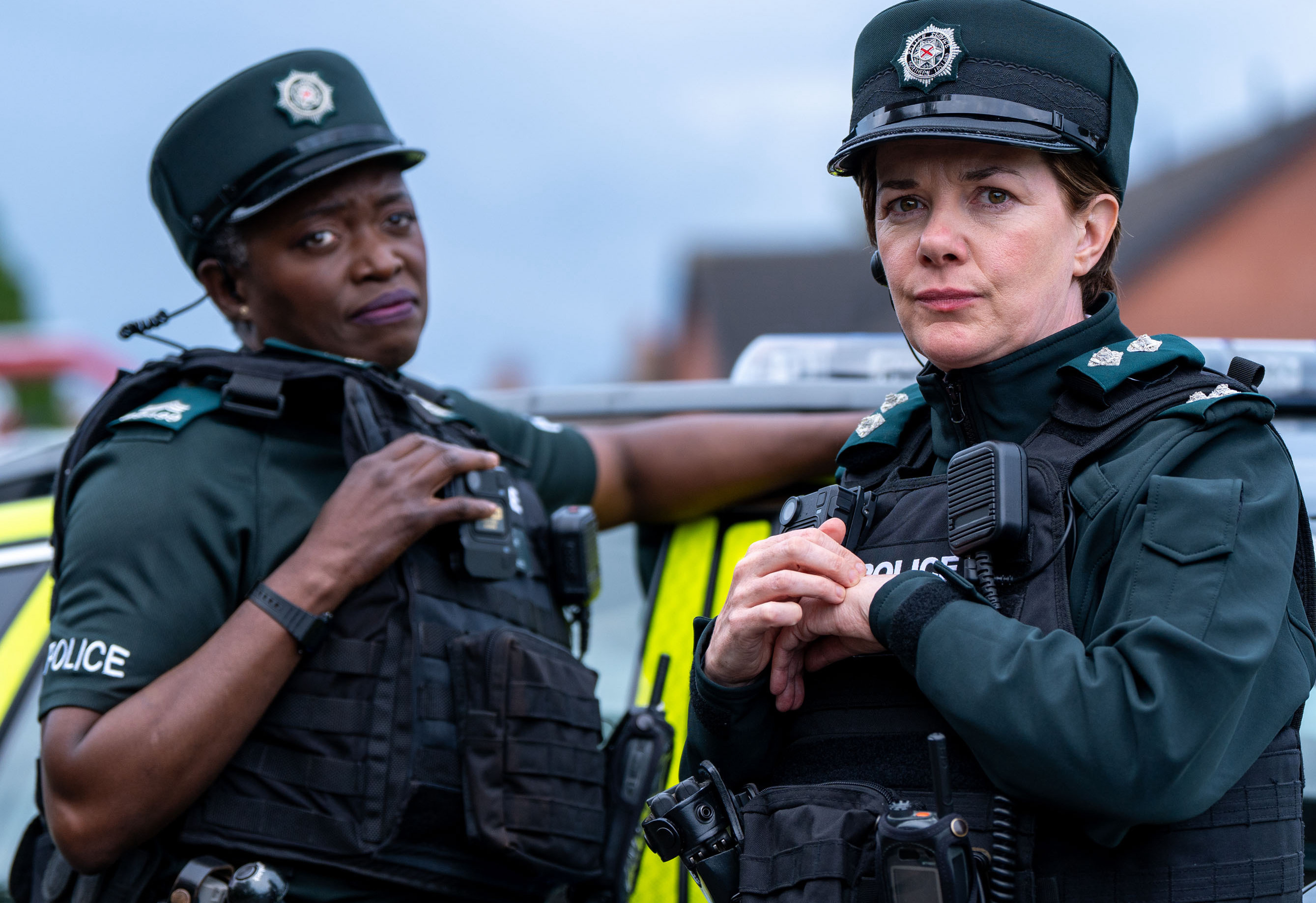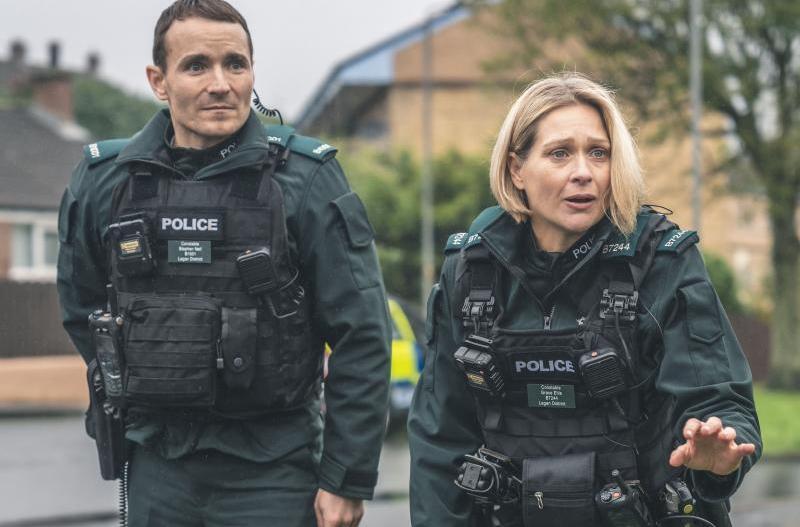The first season of Blue Nights was so close to police procedural perfection, it would be hard for season two to reach the same heights. Overall, it doesn’t, though there are still special moments.
After an exhilarating start, its multiple narrative strands thrash around like eels in a tank. We are back at the response unit in the old Belfast nick, though with a new recruit and a couple of old faces unexpectedly returning. [Spoiler alert for those who didn’t watch season one and ought to.] But the tightness of the writers’ grip has slackened.
It’s a year on, and the rookie cops have bedded in. We are no longer learning the terrain over their shoulders, listening in on the gallows humour of their colleagues. Now the focus is two big schisms, one in the loyalist community, the other within the force itself. On the Mount Eden estate, two loyalist kingpins vie for supremacy, while the police square up over the ethics of their strategies, after charmless DS Canning (Desmond Eastwood) is brought in by the chief superintendent to get results; the response units, as well as their long-serving captain (Joanne Crawford) and sergeant (Andi Osho, pictured below, left, with Crawford), don’t like the cut of Canning’s jib.
In what seems like a sideshow, Jen (Hannah McClean), the posh cop (she’s the chief superintendent’s daughter) who shot a dealer and left to train as a lawyer, is raking over the remains of a 1978 bombing, which unearths, of all people, Charlie Fairhead from Casualty (Derek Thompson), as a guilt-racked cop. In his past is Happy (Paddy Jenkins), the traumatised man from season one who deliberately got arrested so he wasn’t alone. As the series has already been commissioned for another two seasons, you have to assume there’s a three-season plan in play and this strand is going to develop further; here it just jogs to a conclusion without a big reveal.
As the loyalist feud intensifies and corpses mount, one big man dominates the landscape: Lee Thompson (Seamus O’Hara), a former soldier who manages his sister’s pub, the Loyal. Lee is tired of paying protection money to one of the feuding drugs lords and is disgusted by the decline of his old neighbourhood. So he has recruited old army mates from Afghanistan to help him play Coriolanus, a strong man who can take things into his own hands. Lee, like his customers, despaired long ago of the police and the politicians ever cleaning up the mess.
Thompson, a Martin McGuinness lookalike, grows into an absorbing character, once an admirable fighter who now sees the world cynically through hooded eyes. He has the right aims but the wrong methods. In this he is a more messianic version of Canning, who’s a callous pragmatist playing both sides against the middle to contain the locals but not to resolve their issues.
Hanging over it all, with a commemorative plaque at police HQ, is the legacy of the best character in season one, Gerry Cliff (Richard Dormer), a buccaneer with the savvy to get things done, until a round of bullets stopped him. He is much missed by all, especially the viewer. For his colleagues, he was “too good”, too incorruptible. Hints of this kind of goodness can still be seen in wistful widower Stevie (Martin McCann) and former social worker Grace (Sian Brooke), the main will-they-won’t-they cop couple of the series, still sharing Stevie’s home-cooked snacks in the squad car and providing a sweet strand of flirty joshing as the spitting mobs start lobbing bottles and the fists fly.
This season they are joined by two more budding cop couples, attractive people all, but rather pointless in a narrative sense. The most “real” officer is the eccentrically tall older trainer with a lavish moustache and a stiff-legged gait, but he has a long rest between featuring in the cracker of a pre-credits opener and the finale, five episodes later. Also rested for long stretches are the nails-on-blackboard woman investigator from the police ombudsman and Tina McIntyre, now a drugs broker, who is wheeled on when tense meetings are required, notably with “the Dubliners”, the dealers who supply the loyalist gangs. (Her season one role is not alluded to. Has she abandoned it?)
T he writers seem to be dodging the familiar tropes they used in season one: the kneecapping, threats to individual officers, checks under the car before work, the collusion of top brass with the secret services. There’s a gathering tension, but this season it’s more muted. Season one was like an adrenalin spike. We were careening round corners with rookies who didn’t know a dangerous street from a safe one, a well-meaning gesture from a potentially fatal error. Grace in particular drew us in, a single mother whose mixed-race child became a target for bigotry, including in the law. (He has since left home for university.)
he writers seem to be dodging the familiar tropes they used in season one: the kneecapping, threats to individual officers, checks under the car before work, the collusion of top brass with the secret services. There’s a gathering tension, but this season it’s more muted. Season one was like an adrenalin spike. We were careening round corners with rookies who didn’t know a dangerous street from a safe one, a well-meaning gesture from a potentially fatal error. Grace in particular drew us in, a single mother whose mixed-race child became a target for bigotry, including in the law. (He has since left home for university.)
Grace’s vulnerability has a more personal tinge now; her competence is established but secretly she is afraid of being left with only her job to fall back on. Brooke is outstanding, an unshowy performer with a total grip on the nuances of her character who establishes a lovely rapport with McCann’s subty drawn Stevie. It’s still a pleasure to spend time with all the characters, especially Annie (Katherine Devlin), the sparky young cop who always ends up with a bloodied nose; her unflappable superior, Helen McNally (Crawford), and Lee Thompson’s tough sister, Mags (Seána Kerslake, pictured above with O'Hara). A shoutout too for Alfie Lawless playing her young son Henry, who delivers like a pro in one of the most nail-biting sequences.
So, no, it’s not perfect, but there is still enough here to keep you involved and hoping “We can do better”, Grace’s motto, turns out to be true of the writing. It’s still the best cop show on air right now.















Add comment